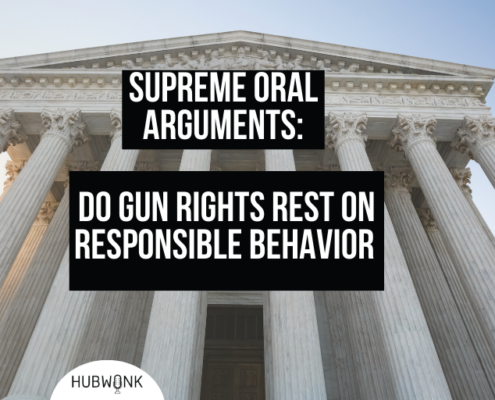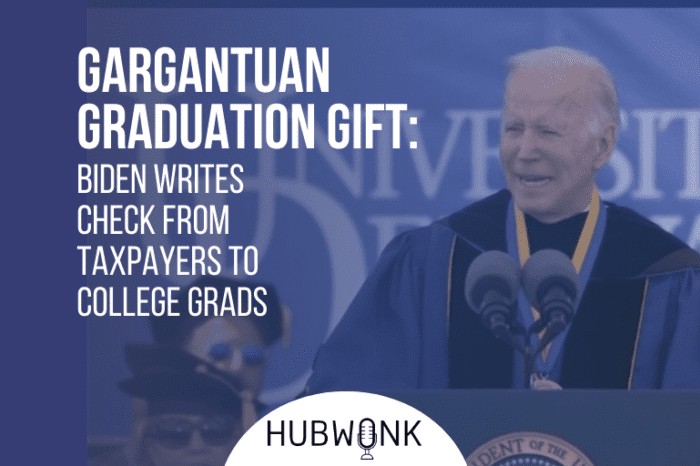Gargantuan Graduation Gift: Biden Writes Check From Taxpayers To College Grads
/in Blog: Higher Education, Featured, Higher Education, Podcast Hubwonk /by Editorial StaffThis week on Hubwonk, host Joe Selvaggi talks with Dr. Beth Akers, AEI Senior Fellow, about the recent presidential executive order to cancel an estimated $500 billion in outstanding student debt. They explore who benefits, who pays, and the likely effects on tuition and the borrowing habits of future students.
Guest:
 Elizabeth “Beth” Akers is a senior fellow at the American Enterprise Institute (AEI), where she focuses on the economics of higher education. Before joining AEI, she worked as a senior fellow at the Manhattan Institute, a visiting research scholar at the Federal Reserve Board, a fellow at Brookings Institution, and a staff economist at the Council of Economic Advisers under President George W. Bush. Dr. Akers is the coauthor of “Game of Loans: The Rhetoric and Reality of Student Debt” (Princeton University Press, 2016) and the coauthor of the chapter “Understanding Changes in the Distribution of Student Loan Debt over Time” in “Student Loans and the Dynamics of Debt” (Upjohn Institute Press, 2015). She has testified before Congress, and her writing and research have been published or featured in Bloomberg View, Boston Globe, Education Next, Newsweek, Time, The New York Times, The Wall Street Journal, The Washington Post, and others. Dr. Akers has a PhD in economics from Columbia University and a BS in mathematics and economics from the State University of New York at Albany.
Elizabeth “Beth” Akers is a senior fellow at the American Enterprise Institute (AEI), where she focuses on the economics of higher education. Before joining AEI, she worked as a senior fellow at the Manhattan Institute, a visiting research scholar at the Federal Reserve Board, a fellow at Brookings Institution, and a staff economist at the Council of Economic Advisers under President George W. Bush. Dr. Akers is the coauthor of “Game of Loans: The Rhetoric and Reality of Student Debt” (Princeton University Press, 2016) and the coauthor of the chapter “Understanding Changes in the Distribution of Student Loan Debt over Time” in “Student Loans and the Dynamics of Debt” (Upjohn Institute Press, 2015). She has testified before Congress, and her writing and research have been published or featured in Bloomberg View, Boston Globe, Education Next, Newsweek, Time, The New York Times, The Wall Street Journal, The Washington Post, and others. Dr. Akers has a PhD in economics from Columbia University and a BS in mathematics and economics from the State University of New York at Albany.
Get new episodes of Hubwonk in your inbox!
WATCH:
Read a Transcript of This Episode
Please excuse typos.
Joe Selvaggi:
This is Hubwonk. I’m Joe Selvaggi.
Joe Selvaggi:
Welcome to Hubwonk, a podcast of Pioneer Institute, a think tank in Boston. In late August, President Biden issued an executive order to forgive as much as a half trillion dollars in student debt. The president characterized the act as relief for those who need it most. Despite the fact that the 42% of Americans with college degrees enjoy a substantially lower rate of unemployment and can expect on average, an additional $1 million in lifetime earnings while critics characterize the move as a gift from poorer Americans to the wealthy college graduates, defenders of debt cancellation contend that the debt was an overwhelming burden that threatened to stifle borrowers, family formation, and life ambitions. Our taxpayers owed an explanation as to why student debt should be forgiven. And before spending more than the wall street bailout that followed the global financial crisis. Shouldn’t the president explain the cause for the chasm that seems to lie between the cost of a college degree and the benefit that leaves graduates without the ability to pay it back. My guest today is Dr. Beth Akers, senior fellow at the American enterprise Institute, where she focuses on the economics of higher education. Dr. Akers has researched the incentives leading to both the trend towards greater student indebtedness and the lack of accountability for institutions of higher education that facilitate public student borrowing. She’ll share with us her perspective on the president’s executive order, including who benefits, who pays and what are the likely effects on future student debt and college tuitions. When I return, I’ll be joined by AEI senior fellow Dr. Beth Akers.
Joe Selvaggi:
Okay. We’re back. This is Hubwonk, I’m Joe Selvaggi, and I’m now pleased to be joined by American Enterprise Institute Senior Fellow Beth Akers. Welcome back to Hubwonk, Beth.
Beth Akers:
Thanks. I’m so glad to be here with you.
Joe Selvaggi:
Wonderful. WellI thought to reach out to you, you had a wonderful article in the Boston Globe and some other places discussing the most recent executive action by president Biden to forgive student debt. We’re gonna get into the details of that. I’m talking to you from Boston. It’s the first week in September. So we’re buzzing. There’s lots of students here. Perhaps they’re all excited about this debt forgiveness, but I wanna take a deeper look and find out what it means for the rest of us. So let’s start at the beginning. You wrote a piece in the Globe talking about the details, but I wanna go deep. What exactly has happened? What did the president do and who is going to benefit from this executive action?
Beth Akers:
Okay, great. So officially nothing has happened quite yet, but we have a promise from the white house to really do two main things. One is what we’ve all been talking about. It’s that we’re forgiving between 10 and $20,000 in student debt for people who are below income caps, depending on whether or not they received a Pell grant, which tells us if their family was pretty well off or not well off when they went to college. So that’s the piece that we’ve been buzzing about. The other piece that we’ve talked less about in the popular media is that at the same time, the president has proposed that we’ll make it much cheaper for students to repay their loans. What a lot of people don’t realize is that we already have repayment programs for federal student loans that cancel loans for students, if they prove to be unaffordable over a long period of time. So what that means is that a borrower pays back an amount that’s affordable based on their monthly income. And then at either 10 or 20 years, 20 years, for most people, we would just forgive whatever was left. Now, the president accelerated that by reducing the share of income that needs to be paid on a monthly basis and making it so that debts are all forgiven after that 10 year period. So, you know, we’re all upset about the loan cancellation. This is probably the much more consequential piece of the policy change.
Joe Selvaggi:
I see. So one is sort of a, a one off, you know, 10,000 boom, it’s wiped out if you a debt of traditional, I guess we’re gonna get into this public loan mm-hmm <affirmative> and for Pell grants, it’s $20,000, right? Before we get into more of that, what are the estimates? You, you, you, you put two buckets. One is the 10 and $20,000 forgiveness. And the other is the acceleration of the payments. Mm-Hmm <affirmative> we have an estimate of how much money that will cost the federal government and because the federal government doesn’t have its own money. How much will it cost all of us?
Beth Akers:
Yeah. So the best estimates for the cost of the cancellation piece, it’s about 500 billion, but to be honest, I’m not putting stock in any single number. We don’t really have a good sense of who’s going to apply and get this benefit. You know, or how wide reaching it’s gonna be. Researchers just don’t have the data to know who’s gonna benefit. And so there’s a lot of uncertainty about what that total price tag is gonna be. Other than that, it’s gonna be huge. That’s, that is certain the up piece of it, we don’t quite know yet, and that’s much more difficult to estimate, but certainly increasing the current costs of that program by a very wide margin.
Joe Selvaggi:
So that’s a big number, even if we don’t, we can’t hang ahead on precisely 500 billion, is that the wall street bailout in 2008. And, and we’re still talking about that more than a decade later about what a boondoggle that was perhaps this is of that sized and magnitude. So
Beth Akers:
It was of that size. And remember that was money that got paid back <laugh> right through the TARP program. This is money that’s going out the door and never coming back.
Joe Selvaggi:
So let’s talk about it’s going out the door. Clearly, people who have student debt have gone to college, at least some college what percentage of people go to college and I’m gonna slip in another question, are these debts just something that at their local bank, or is these, are these particular student debts that is public student debts versus let’s say if we went to the bank and borrowed money on our own.
Beth Akers:
Great. Yeah. So the vast majority of outstanding student debt in the economy is federal student loans. And so the president’s executive action only addresses loans that were taken through the federal student loan program, which is like more than 90% of the debt. People sometimes take private loans most often for graduate school. And sometimes for undergraduate, if the maximums that they’re allowed to borrow from the government aren’t enough. But that’s a small share. That’s left untouched here. So we’re only talking about the federal program. And so this isn’t imposing a cost on banks, or, you know, the, the financial markets in any way, this is all just a federal program. And a lot of students are taking, I can’t remember the share of students who are taking debt, but we’ve seen it, steadily increasing over time. And the ability to finance higher education out of savings, or by working your way through college it’s just no longer existent for most families. So financing through federal loans has kind of become the de facto way of paying for college in the United States.
Joe Selvaggi:
Now the president’s characterizes, so debt is enormous and crushing and really made it sound as if people really can’t start their lives. They’ve graduated college. They’ve got this huge millstone around their neck. They, they can’t, you know, they can’t buy houses, they can’t start their lives. It’s this, this debt is prohibitive in our earlier conversation. Our earlier episode, you characterize how much debt the average student has and, and where the small amounts and the big amounts let’s, let’s start broadly. What is the average student graduate with an undergrad, a BS how much debt do they have
Beth Akers:
A typical student leaving a bachelor’s degree will have about $30,000 in debt. And that is because that is essentially where the limit is on federal student borrow away.
Joe Selvaggi:
Mm-Hmm <affirmative>. I see. And, but there are those who have of much larger debt. What, what are those who have the say a hundred thousand dollars debt? What, what, what would characterize that kind of a student?
Beth Akers:
So students with those fit six figure debts that are often portrayed in the popular media characterizations of the issue. Those are people who borrowed for graduate school. So unlike undergraduate borrowing, which has these pretty reasonable limits, right? $30,000 for a degree that on average pays a million dollars of extra earnings. That seems like a fair trade, right? For graduate school, students are able to borrow largely without limit. And so that’s where you get those really large balances that you know, surprisingly though these aren’t the ones, statistically, that people have the most trouble paying back. In fact, it’s the very low balanced borrowers who struggle the most. The reason is because those are people often who started college and didn’t finish.
Joe Selvaggi:
I see. So I, I, I don’t wanna go too far down this whole, but I just wanna say the, the president talked about these as the people who are most in need college graduates who are most in need. It, it seems odd to me relative to those who don’t go to college and naturally, if you don’t go to college, you don’t have college debt. If you do, you may. What does, what is the benefit? I’m sure you’ve studied this. What is the lifetime benefit of a lifetime of a college degree in terms of earnings and are, what are the relative, let’s say unemployment rates. I dunno if you have that number, those numbers fingertips, but someone must be measuring that.
Beth Akers:
Well, I really take issue with the fact that, you know, policy makers are characterizing people with student debt as the neediest in the economy. Not everybody who goes to college is getting a great deal, right? We know that cuz we read the, the New York times reports about people who are working as baristas with the a hundred thousand dollars in debt, right? So we know those cases exist or people who really are struggling, but the averages tell a different story. And the average is what’s the typical experience. Georgetown university has a program that studied the returns of education. Very intensely. Their estimates indicate that someone with a bachelor’s degree will earn an extra million dollars over the course of their career relative to someone with just a high school diploma. So thinking out $30,000 in debt gets you a million dollar bump in earnings over your lifetime, seems like a pretty good deal.
Beth Akers:
And in fact, it’s for the most part, a wealth enhancing activity to go to college, even if you have to borrow to get through. And yes, we know that college educated workers have lower rates of unemployment than less educated workers. Sort of funny almost to think about the fact that we put these student loans, repayment on pause throughout the COVID economic downturn. And even until, you know, just recently until the president promised to have those loans go back into repayment at the end of the year, but college educated workers were the ones who largely kept their jobs during the, the, the recent maybe recession. And that’s generally the case that these workers are, have much more robust jobs and attachment to the workforce.
Joe Selvaggi:
Indeed. I hadn’t thought about that angle, but I guess the justification and w we can talk about that now, w the legal justification, if there is one, was presumably there was an extraordinary event, I guess it was the COVID pandemic that caused an emergency mm-hmm <affirmative> those people with college degrees, many of them are, are commuting from zoom. Whereas they’re trying, didn’t go to college who maybe borrowed money to buy a truck or a van, or to start an apprenticeship as a, a plumber or, you know, whatever they happen to have those people had to go to work or couldn’t go to work. Mm-Hmm <affirmative> they were most impacted college graduates were in many cases, unscathed, their perhaps did better. And yet this is sort of the justification for this forgiveness. Do I have that right? I, I, or am I missing something?
Beth Akers:
Well, I think that’s the legal justification. So there’s the, you know, the political angle. I think that Democrats largely feel like people who participated in federal student lending are victims in some sense, that seems to be a separate argument from the, what they’re using as the legal justification for this executive action. So, yes, if you look at, you know, why can the white house do this? Why does president Biden have the authority to cancel student loans? They’re leaning on some authority that was given to use in times of emergency. And so I think they are ascribing the current moment to an emergency that was caused by COVID in reality. I don’t think anybody really believes that to be true, but that is the legal basis for this intervention.
Joe Selvaggi:
Indeed, the, the pandemic seems to have hit the college graduates, least hard, and yet they’re the ones with that are getting this money. I wanna go a little bit deeper into this idea that again, the narrative that college graduates are victims of something. I think I may actually agree with this point, because I think let’s imagine we were to take out money to buy a house. We have a $500,000 house. We have $500,000 mortgage let’s assume a hundred percent mortgage. We’re essentially trading the debt for a house that we value more than the debt. And if we default the, the bank takes the, the house back mm-hmm <affirmative> so assuming that a college degree is worth something we, we borrow money, we buy it and then we have it. And it, as you say, generates a million dollars worth of lifetime income, if indeed it doesn’t meaning these people are indeed victims. And so an education that is either worthless than they paid for it, or indeed genuinely worthless. Isn’t, that’s the bigger problem. And isn’t that essentially almost like predatory loan <laugh> giving up. Yeah. I mean, I don’t wanna put words in your mouth, but to me it seems like everyone is admitting that a college education isn’t worth what you pay for. Otherwise, you wouldn’t need relief.
Beth Akers:
Yeah. So great point. So in normal consumer credit markets, there’s a process called underwriting that happens. Underwriting basically means that before you give anybody a loan, you look into their circumstances and you say, does this seem like a loan that you’ll be able to pay back to me? <Laugh> we have no underwriting in the federal student loan program. So if that sort of lending were happening in the private market, absolutely. We would say these are predatory loans. We’re handing out loans to people that data tells us that they’ll probably never be able to repay. Yet we do that semester after semester in higher education. And the idea is that we don’t wanna constrain access. We want everybody to be able to go to college. I love that idea. I wish everybody could go to college, but if we’re going to put it on the individuals to pay for it themselves we’re not doing anyone any favors when we give them loans that are unaffordable. So I think it’s absolutely fair to say that some of the lending that takes place through the federal loan program is predatory. Now, again, I wanna emphasize on average, people are doing great with these loans, their low interest loans to invest in something that historically has given a great return because of the employment opportunities that it creates. But there are many instances where we almost know full well before the loan is made, that that borrower will never be able to pay back. And yet semester after semester loans are given out like that.
Joe Selvaggi:
Again, I don’t wanna put words in your mouth, but again, we are talking about two groups of people in the United States, those with college degrees and those without, and we’ve already established the earning potential is higher for the graduates than in general mm-hmm <affirmative> than those without are there income caps within this? In other words, if I do go to a good school, get a great degree and make lots and lots of money, and yet I hold, I hold debt because, well, it’s a, a, a subsidized interest, right? It’s a lower interest rate. So yeah, you know, a wise person would perhaps leave that debt alone and borrow mm-hmm <affirmative>, you know I keep it as long as he wants. Is there an income limit or is this indeed just a handout to relatively wealthy people?
Beth Akers:
Well, the income limit from the executive action was individuals earning under $125,000 a year, and couples earning up to $250,000 a year. So for contacts, those are two and three times the median household income in the United States. So these are not particularly aggressive limits. If you think of a household earning $249,000 a year, I, I tend not to characterize them in my mind as being particularly needy though, of course, you know, if someone would argue in New York city, that’s not a great standard of living. But you know, I really believe that the administration in putting those income limits in place was responding to criticisms from the right before this policy, you know, was announced, which was that this is a hugely regressive intervention that when you give money to cancel student debt, especially for graduates you know, you are giving a lot of money to people who are at the upper end of the income distribution and totally ignoring the bottom, which is people who didn’t go to college at all, and didn’t borrow or people who started college and, and didn’t finish. Right? So I think of that as being three groups, there’s the people who never went to college. These are the lowest earners in the economy. Then there’s the people who started college didn’t finish, but have some debt. This is a group I’m genuinely worried about, and I really do think they need some support. And then there’s the people who took out loans and finished. So those last two groups are the ones that get the aid when it should have been the first two <laugh> that, that are getting economic support
Joe Selvaggi:
And, and D, and that sounds like it would be theoretically politically unwise. I mean, we, we discussed briefly whether it’s, it’s legal, the question of debt forgiveness, I think it was last year or that the question was put to Nancy Pelosi. I had the quotation here. She said, unequivocally, quote, the president can’t do it. So that’s not even a discussion. Mm-Hmm, <affirmative> not realizes that she said, but the president can only postpone delay, but not forgive yet. And yet he has, or at least plans to forgive. Is this politically even whether you’re on the left or you’re the right. We talked about those who never went to college being in the minority. And if we’re talking about $500 billion of expense and we all pay taxes, that’s, you know, my back of the napkin calculations, about $3,000 per taxpayer, mm-hmm, <affirmative> everybody in the United States, whether you went to school or not, will, it will cost them $3,000 to give college graduates 10,000 or $20,000, or, or how is this politically wise? I mean, again, this might be outside your expertise, but it seems to
Beth Akers:
Me, oh, but I have ideas. It doesn’t matter. I’ve heard
Joe Selvaggi:
The last. OK. Let’s hear
Beth Akers:
That’s great. Well, you know, I don’t know. I think a lot of people knew this was gonna be unpopular before it came. You know the far left was really pushing for this aggressive cancellation proposal. If you look back at what Biden was saying during his campaign, he had the most modest of all the forgiveness proposals from all the democratic candidates in the, in the primary leading up to the 2020 election. And, and then some of his remarks early in his presidency, you know, reflected his concern that a lot of the money was going to be going to graduates from these elite institutions. So, you know, I think he was fully aware of the policy concerns, but, you know, we also were seeing, you know, prior to the most recent legislation passing, I think there was a real sense that Democrats had not accomplished enough with the control in DC, that, you know, they’d been holding and that it was gonna be necessary for them to check off something going into midterms, that they could hang their hat on as an accomplishment.
Beth Akers:
My sense was that this became that’s something that they felt like, you know, maybe it was legally dubious for, you know, for them to carry this out, but that they were going to give it a shot. I was hopeful when the recent legislation passed that they would abandon this effort, but, you know, it must be that the calculation is that this is beneficial to a segment of democratic voters that they really need to turn out in midterms. And the fact that it irritates Republicans, the fact that it’s not enough for, you know, super progressives, it kind of doesn’t matter because you know, elections are about turnout, right. And so if, if it drives turnout among this group, you know, the highly educated mostly democratic voter then that may be that may the calculus it’s gotta be, because I don’t think that it was a surprise to anyone that there was, was sort of a backlash when this came out.
Joe Selvaggi:
Yes. as you say, the, the far left, I think the, the the signs I read as don’t go small, cancel at all. So they’re satisfied with the $20,000 they wanted at all. And of course, on the right looking out for the working man, mm-hmm, <affirmative>, I think this is of course the classic case of concentrated benefits and diffuse costs. Yeah. We see far too often now for those listeners who are like, look, you know, look, the government spends money on all kinds of things. I don’t like given it to kids who went to school and, you know, struggling to pay it back, you know, I can still sleep at I don’t mind this is not that bad in my list of things a president can do wrong, but I I’d like to look more deeply sort of as a, an economist, looking at the effects of these kinds of acts that will have unintended consequences on future borrowers and also future,to those who set future tuition,putting on our economist hat now and say, okay,if this is water under bridge, and we can’t do anything about it, perhaps we can, but if we can’t, what is the effect on,let’s say that person about to consider going to school, maybe they just pulled up to drove to Boston for their first,year of college.
Joe Selvaggi:
What is the likely effect on the borrower? And then let’s talk about what’s the likely effect on, on universities going forward.
Beth Akers:
Yeah. Great point. I mean, you know, <laugh>, I do a lot of call in radio shows and those callers are pretty angry about how this is unfair. And I say, yeah, yeah, but life’s not fair. Right. <laugh> and so that’s the least of my concern. My concern is going forward, what happens and what I’m very afraid of is that we’ve sent the message to future students that when you borrow and take on student, federal student loans, this is not money that you’re gonna have to pay back. Now, can you imagine you’re about to go out and buy a car, Joe, and you have just been given the message that, okay, you’re gonna take out a loan to, to, to pay for that car. But you’re probably not gonna have to pay it back. Do you think that changes the type of car you’re gonna be looking for?
Joe Selvaggi:
Of course, of course
Beth Akers:
<Laugh> okay. So my belief is that, and this is untested, right? We’ve we’ve never done anything like this. So we’re trying to, we’re sort of projecting, trying to imagine what’s going to happen. My concern is that that student now has that message that they don’t need to pay back those loans. And they’re thinking, Hey, maybe I will go to that really expensive college. Maybe I will buy a car so that I can commute a real, a nicer car. You know maybe I’ll, you know, borrow, even though I have some money in the bank account, right? This additional willingness that students will have to spend is bad for them because they might actually have to pay it back. We don’t really know what’s coming. But it’s also bad because institutions, colleges and universities are gonna respond to that by raising their prices. Now, people say like, Beth, you’re so cynical, right?
Beth Akers:
People, people aren’t aren’t bad. They’re always gonna try to do what’s best. This is basic economics, right? This is, this is you give people more money. They’re willing to spend more, okay. Subsidies drive up willingness to spend. And then at the same time, when you have an increase in demand, that comes from that willingness to spend sellers in this case, colleges and universities increase the price. It’s not controversial. I’m not saying that these are bad people or bad institutions for that happening, but I really believe that that’s what’s to come and with, you know, the run up in borrowing and the, the rampant tuition inflation being the really primary concerns about higher education finance in this country. It seems like we’ve just exacerbated both of those problems.
Joe Selvaggi:
Indeed. If you know the money you’re borrowing to go to school may not have to be repaid. As you say, you you’re willing to spend more, but you’re also pressed less inclined to scrutinize the value of that education. Mm-Hmm <affirmative> if you take on a lot of debt you know, you better bloody well know how to pay it back. If you don’t have to pay it back, you know, what difference does it make? If you go to law school or you get a degree in puppetry really it’s, you know, it’s a, a debt that is not your your concern. Mm-Hmm, <affirmative> I I’m very concerned about that because some of our elite schools already don’t charge tuition for UN beneath a particularincome. I think it was Princeton announced just yesterday that families making less, $150,000 don’t have to pay any tuition and they actually get a stipend. Right. But we’re talking about those expensive schools who have, let’s say the value of their degree may not be what we hope.
Beth Akers:
Right. Right.
Joe Selvaggi:
So I, I, I want to, of course, give us time to say, okay, look, this is a big sort of Gordy knot mess of, of, of distortions in price and ability to pay and, and signals. We don’t know if what we’re spending on college is worth it. We don’t know how to go about borrowing. We’re not underwriting. You mentioned that. So I’m gonna give you a chance, because you said this all the time to say, okay, we’re a, we’ll say queen for the day <laugh> or longer. And you were setting policy and perhaps we will see a big change in in control of Congress after the November election. What would you encourage? Those people who wanna roll up their sleeves and not put ourselves in the situation where we have lots of kids who have debt and can’t pay it back. What would you do to reform the system to make it let’s say from an economist perspective, more efficient.
Beth Akers:
Yeah. Great. So there’s one thing. I mean, there’s lots of things, but I’m gonna give you the one thing that I think is the most consequential. I think we need to stop making loans that we know are unaffordable, right? So right now, like we said, there’s no underwriting and federal student, student loan program, all institutions are eligible to give out student loans to the federal maximum, regardless of whether their last cohorts of students have been able to repay those loans that they took out, you’ve gotta end that system.
Joe Selvaggi:
So I just wanna say, I wanna ask, so you’re saying there’s schools that reli who graduates reliably do not pay back their loans. In other words, they’re handing, they’re charging for degrees. Kids are graduating and they’re defaulting on a consistent basis, and there’s a pattern and there’s sort of, no, there’s nothing to stop that right now.
Beth Akers:
Exactly. Right. And we’ve heard a lot about how for-profit institutions do that, right? I mean, peoples love to hate on any for-profit participation in education, but this is happening at public institutions. This is happening at private non-profit institutions. Certain programs of study are reliably churning out people who can’t afford to pay back their loans and the loans end up getting paid off by taxpayers. That’s gotta stop. And right now the gatekeeper for those loans and who determines, you know, which institutions are able to participate is a process called accreditation. So there’s these third party organizations that say, yes, you look like a lovely college or lovely university. Go ahead, give federal student loans to your students. And the department of education relies on that stamp of approval to say which institutions can get loans and which institutions can use Pell grants. I think we’ve gotta get rid of that convoluted process and just look at the results.
Beth Akers:
So if an institution has students taking out loans that are succeeding and paying them back, keep them in the program, keep allowing them to use taxpayer dollars because it’s supporting good investments. If institutions are constantly having students default on their loans, cut them outta the program altogether. Now you could start to scale it back. So that poor performance means lower loan limits for students, or you can get them outta the system entirely. I mean, there’s a lot of ways to do it, but I think the, what it boils down to is just not making new loans that are unaffordable for students and end up getting picked up by taxpayers. It’s not good for taxpayers, and it’s also not good for the individuals, right? Yes. It’s going to affect the eligibility for some Stu or the accessibility for some students to get into college, right. Because, you know, they’re, they may not be able to take the loans to go to their local community college or their local private institution. But those loans that they would have gotten were loans that were gonna have them underwater for the next decade of their life. Anyway, those aren’t good loans. They’re not loans that we want to make. So that’s the one thing I would change. And I think that would have a lot of ripple effects that would you know, end up with a much better system of finance.
Joe Selvaggi:
So you were kind of coming for full circle. And with my question about, it may be the case that we almost clearly can accept that in many cases a college degree is not what worth, what you paid for it mm-hmm <affirmative>. So by holding institutions accountable that don’t deliver on the promise to, in a sense, improve someone’s life, those are no longer available, but it, it will have, let’s say the unfortunate effect of, of excluding those people who need loans to go to school from getting that degree. But what you’re saying is that degree wasn’t doing them many favors. I, I guess the effect would be then to encourage schools to have either more useful majors or lower tuitions. Am I stating the office there?
Beth Akers:
Yeah. And either of those things are fine with me. And, you know, unfortunately I think this would fortunately, or unfortunately this might affect that puppetry program that you were talking about, for example. And I don’t, I don’t think we should do away with all arts programs, right. That would be a potential consequence of this, but I think we should subsidize them differently. So stop putting the, these unaffordable loans to students, to pay for them and say, if we socially value arts, we need to pay for it. Right. We need to give grant money to institutions or give grant money to students who wanna study in these programs. The idea of giving people unaffordable loans in order to sustain something with social value is just kind of a wacky idea.
Joe Selvaggi:
Indeed. And also the, some of your proposals. I, you had an excellent article in recently published in national review talking about consolidating the, the debt process. So you’re, you’re, you’re, you’re your first answer was about how to reform how we hold institutions accountable. But I think you also had written about streamlining the process for getting a loan in a sense, having everybody go to one place and have some sort of standardized less Byzantine process that again complexity mm-hmm <affirmative> is a subsidy for the rich and informed the complexity also excludes those people who have less money, less time, less experienced parents who didn’t go to college and don’t understand the process. You had some good ideas along that. So share with our listeners what you had in, in mind there. Yeah.
Beth Akers:
Yeah. You know, people are often surprised to learn that there’s already protections in place for borrowers who end up with unaffordable loans. And that’s really sad. I mean, we are, we are already forgiving loans that prove to be unaffordable, but the people who are taking advantage of that are people who go to expensive law schools and know how to navigate the system. So the reason that that’s not known by everyone is because we don’t have a streamlined system. There was never a point in time where policy makers decided, Hey, let’s make sure that, you know, when people borrow to go to college, that if it’s unaffordable, then they don’t have to finish paying it back. And so instead we’ve had these piecemeal policy changes and over time, you know, some incremental change to executive order, little bit of PO legal legislative change here. And so what, we now have a universal program safety net, so that everybody is eligible for that benefit for that protection.
Beth Akers:
But you gotta jump through hoops to get it. So we’ve gotta just do away with that. We, we need to pass legislation that just, you know, puts in place a system that everybody’s in the same boat automatically. They’re gonna pay back based on how much they’re earning and automatically if that loan is unaffordable for them in the long run, then it gets forgiven that way. These aren’t benefits that are exclusively reserved for people who know how to navigate the system. And, you know, it’s also likely, I think that if we have that working better, we’ll stop having these calls to have these widespread inefficient loan cancellation events, because people will recognize that we are helping the people who need it the most.
Joe Selvaggi:
Indeed, I think we, we, those, those are excellent ideas, a a sort of a streamlined way to get into college and, and as a more sort of transparent accountability for those colleges that they ultimately will borrow to, to go attend. I know our, our listeners have enjoyed our conversation and want to read more about your work. I mentioned your article in national review and also in the globe, your opinion piece, where can our listeners go to find your work on an ongoing basis to, to sort of help inform them on, on future policy choices?
Beth Akers:
Well, my day to day rants can be found on Twitter. I’m at Dr. Beth Akers and all of my work is published at the American Enterprise Institute.
Joe Selvaggi:
Great, fine. I institution, I read your work there as well. I really appreciate your time today, Beth. You’ve been a wonderful guest on the podcast. This hits home here in Boston. You know, every third person is going to school. Sothis affects everyone here. So we’re very grateful for your research and your knowledge and the time today. Thank you for joining Hubwonk.
Beth Akers:
Thank you very much.
Joe Selvaggi:
This has been another episode of Hubwonk, a podcast of Pioneer Institute. If you enjoy today’s episode, there are several ways to support the show. It would be easier for you and better for us. If you subscribe to Hubwonk on your iTunes podcaster, if you want to help make it easier for others to find Hubwonk, it would be great. If you offer a five star rating or a favorable review, we’re always grateful. If you share Hubwonk with friends, if you have ideas or comments or suggestions for me about topics for future Hubwonk episodes. You’re welcome to email me at hubwonk@ pioneerinstitute.org. Please join me next week for a new episode of Hubwonk.
Recent Episodes

U.S. Manufacturing Health: Does the U.S. Need an Industrial Policy?
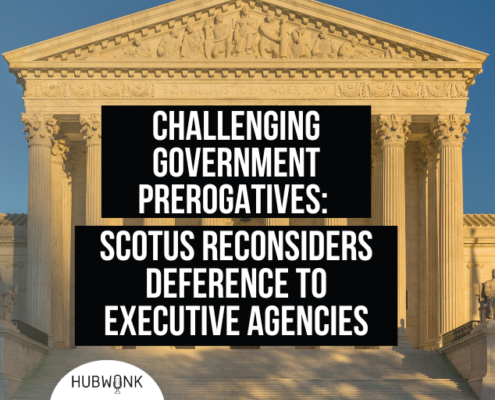
Challenging Government Prerogatives: SCOTUS Reconsiders Deference to Executive Agencies
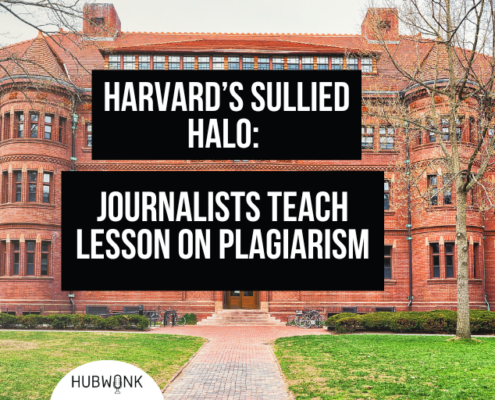
Harvard’s Sullied Halo: Journalists Teach Lesson on Plagiarism

Drug Discount Distortions: How Middlemen Increase Costs and Reduce Access

Boston’s Building Bargain: Coaxing Commercial Conversions to Condos
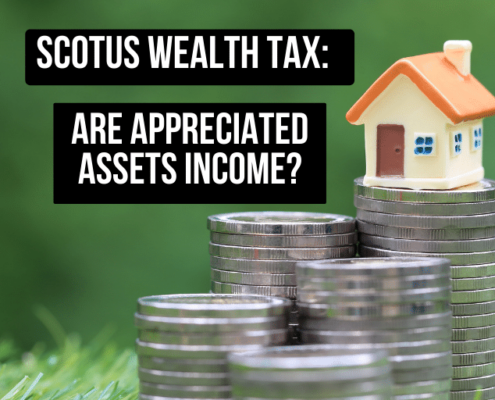
SCOTUS Wealth Tax: Are Appreciated Assets Income?

Busting Big Business: Antitrust Comes for Google and Big Sandwich
